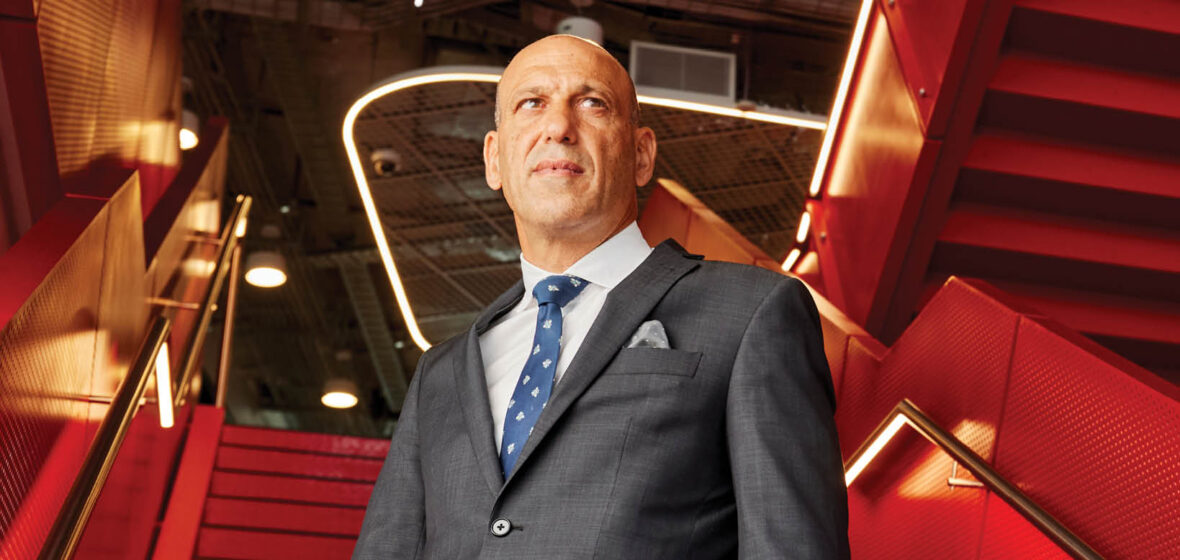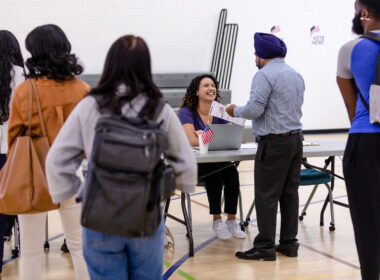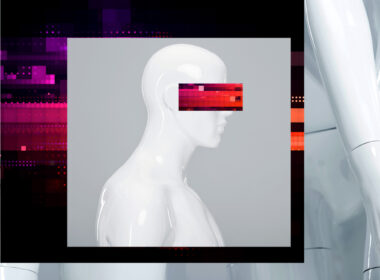“Can you imagine a person with the name Imad Abdul-Karim in the 1990s, graduating from a law school with no track record – sending job application after job application? Sometimes, you get a rejection letter; other times, you don’t hear back. But you have to try.”
“Please, call me Imad”, says His Honour Magistrate Imad Abdul-Karim on the phone, scheduling the meeting with the Journal. He says he doesn’t really care for the formalities outside the courthouse. It is something other people of the same seniority may say, but here it feels genuine. Imad is seen as a human being first: the result of all the experiences which have led him to this point in time.
For Imad Abdul-Karim is not just a Magistrate at Liverpool Local Court. He was a leading prosecutor at the DPP for over a decade, overseeing some of the first and most famous cases of high-profile terrorism in Australia. He was the first appointee who graduated from Western Sydney University. He’s a refugee from Lebanon who arrived in Australia at the age of 15. He’s a father of two. A husband. He is a surfer in his spare time. First Imad, then a magistrate.
Abdul-Karim projects familiarity and warmth, all the while remaining modest and civil. When not on the bench, he reveals himself like an open book, offering up his emotions.
At the 2023 Law Society Annual Conference closing plenary session, he candidly discussed about his mother’s influence on his accomplishments. “If it wasn’t for those values that were instilled in me, I wouldn’t have achieved anything remotely close to what I have achieved”, he said to an audience fighting off the tears.
An Australian story
In 2017, Abdul-Karim was sworn in as a magistrate. “I know that my story is part of the Australian story”, he said at the start of his speech, with his father Nicola, and mentor Supreme Court Justice Geoffrey Bellew present in the audience.
Abdul-Karim and his family arrived in Australia as refugees from war-torn Lebanon when he was just 15. Speaking little to no English, he could not attend a public school and instead had to join a special school to learn the language. Teachers were concerned this could be a barrier, putting him in the lowest class, but also feared that “it was unlikely I would excel”.
“It’s a bit like being in a storm, “ he now reminisces of those times.
“You try and find how to get out of the storm safely without realising what is happening around you”. In hindsight, he can now reflect on the hardship and obstacles he had to overcome, “but at the time, I was focused on trying to do well at school”.
Maths and science ended up being the perfect avenue for the young Abdul-Karim. They are universal languages accessible to all, regardless of geographic and economic status.
Mathematics is concrete and absolute, and science is pragmatic and straight to the point, unencumbered by the nuances of literary language. There are no figures of speech there, only truths. For a teen Abdul-Karim, that would have felt liberating when moving to a new country, on the opposite side of the world, where everyone speaks a different language. This was a way he could express himself easily. He confesses spoken language was a problem, but he could understand written English.
Galvanised by education, he took on a science degree, but as part of it, he was required to do a non-scientific subject. At the suggestion of another colleague, he chose “Introduction to Law”.
“I recall vividly the Dean of the Law School telling us we would be the future of our society. Some of you may be the next political leaders, some of you will be the judicial officers, and some of you will be the next head of corporations”.
“I found I really enjoyed it”, he says, despite having much to read. “I found law important because it regulates every aspect of society, interactions between the citizens and the state, and interaction between the state and the international community.”
This was the crossroad moment for Abdul-Karim. He realises that society could create the best and most prepared scientists, but without the rule of law, there are no foundations to help people properly perform their functions and duties.
So, after a while, he decided to change courses and apply to the newly established Law School at the University of Western Sydney. He confesses it was a relatively small group but inspired by enthusiastic lecturers.
“I recall vividly the Dean of the Law School telling us we would be the future of our society”, he says. “Some of you may be the next political leaders, some of you will be the judicial officers, and some of you will be the next head of corporations”.
He, in particular, would ultimately be appointed magistrate, the first ever from that law school.
Abdul-Karim admits this determination to persevere came from his mother. It’s still difficult for him to talk about her without getting emotional, and for good reason. A teacher back in Lebanon, she imbued in her children the importance of education. Coming from a poor family, her father didn’t believe in education, which wasn’t free in Lebanon. She had to work as a servant to get an education and ultimately finished her qualification to become a teacher.
Her qualifications didn’t transfer to Australia but ever determined, she started her studies again, aptly also at the University of Western Sydney.
“I owe a lot to the values my mother instilled in me”, Abdul-Karim says.
Even before he graduated, he was offered a job at a law firm. The plan was to gain experience as a solicitor and then pass the bar exam, but the unexpected intricacies of life forced him to re-evaluate his options. For Abdul-Karim did not like the experience of working at the firm.
The reasons why are not necessary, but after a while, he met with a partner in the firm and presented his letter of resignation, even though he had signed a two-year contract.
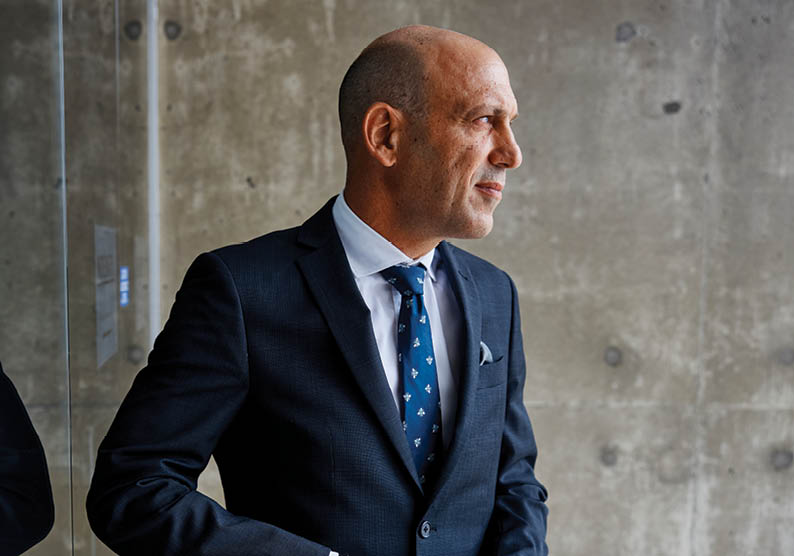
Abdul-Karim tells this story like he knows this was another defining moment in his life, another crossroad situation: the partner, sitting on the other end of a large desk, flicks the letter across, declaring the resignation is not accepted. He knows a lot of people in the profession, a lot of judges, “and if you resign, you will not work as a lawyer in this state”.
Abdul-Karim pondered his options, but calling his wife Salma sealed the deal. Their first son, Nicholas, had just been born, and this could dictate a delay in their plans. Salma said she would support him no matter what, and on the next day, he presented his resignation and drove a taxi for eight months while looking for a new job.
“The words of that partner resonated in the back of my mind, and I questioned whether I made the right decision,” he says. “I questioned whether my law degree was all for naught, whether I should go back and work as a scientist”.
Abdul-Karim remembers speaking to other law professionals about his career path. He was often told that, though he was a bright person, his accent could hurt his chances of success. First, they told him he needed to ensure his communication skills were perfected and that he could present a case properly and not get the judiciary offside. The obstacle wasn’t a deterrence. Abdul-Karim allowed himself to fail along the way and try again as many times as necessary.
“In hindsight, I would’ve liked to be given more opportunities”, he says, reflecting on the difficulties he faced at the start of his legal journey.
“Can you imagine a person with the name Imad Abdul-Karim in the 1990s, graduating from a law school with no track record, with no exceptional marks – but what I call a slightly above average credit – sending job application after job application? Sometimes, you get a rejection letter; other times, you don’t hear back. But you have to try.”
Winds of change
Opportunity came from the Crown Solicitor’s Office. Abdul-Karim worked as a law clerk in a large litigation case involving the state of New South Wales and two big telecommunication companies. He was immediately offered the opportunity to work for the Commonwealth Director of Public Prosecutions office. His first case involved an alleged assault on a United Airlines Flight from Los Angeles to Sydney. In those circumstances, Abdul-Karim had to determine if an Australian law was being broken and the appropriate charge. He says that this case allowed him to look through legislation and think truly like a lawyer.
At the CDPP, Abdul-Karim was then assigned the case of Zaky Mallah, the first person charged under Australia’s anti-terrorism act. It landed on him almost accidentally, he confesses. He agreed to help the police with advice on a case before charges were pressed.
When the decision was made to proceed with charges, the director asked Abdul-Karim if he would like to continue with the case. Unbeknownst to him, this undertaking would shape his career going forward, as he went on to work in other essential anti-terrorism cases in the country, including Operation Pendennis, which dismantled a terrorist cell in Victoria and New South Wales, and resulted in charges brought against 14 people across the two states.
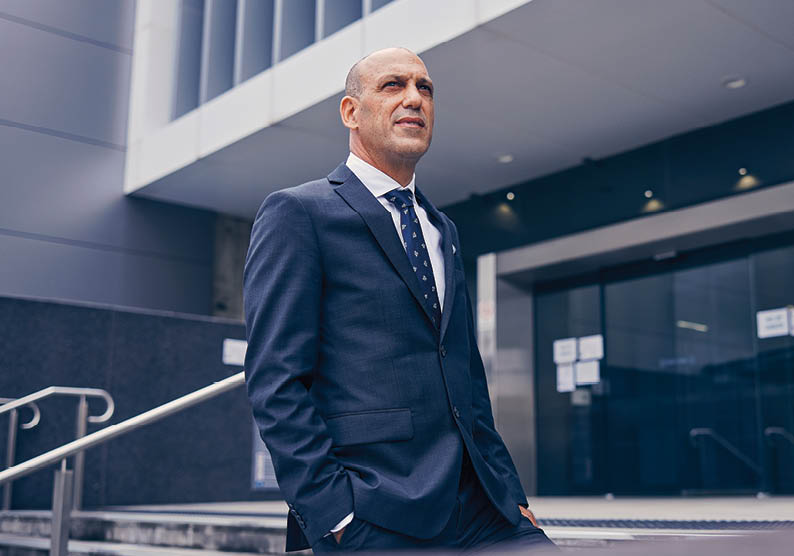
He understood the weight of working on these cases but remained focused on ensuring the proceedings complied with the rule of law. “As a lawyer, you have to apply the law to the facts and circumstances”, he says.
In the case of media attention and a political spotlight, he quickly understood not to let himself be distracted by the uproar and the discourse.
“One of the things about terrorism that makes it different from other crimes is that if the cases are not prosecuted properly, they can be used in a way that is adverse to the rule of law,” he says.
He adds these cases can be perceived differently by people who are terrorists or terror sympathisers themselves. “But if it is dealt with, according to the rule of law, I think the community will see that it is a crime, no different to any other crime.”
“I had hair before I started the case,” he jokes, but a half-truth in the sentiment represents how seriously he took the task. It wasn’t just how the case garnered interest in the media, but also how different communities in society would perceive such a prosecution.
He saw he had to detach himself personally from the matter to keep an impartial and just approach. “If you have any personal interest in the outcome, even if minuscule, you need to move away from the case because you will apply the law in a mechanical way”.
This is when he believes his science degree is valuable.
“At times you wish you could correct certain things, but ultimately I had trust in the system, that once the light is shone on the case, the community will see how it was done”.
This transparent approach to law opened the door for Abdul-Karim to be one of the leading prosecutors of terrorism cases in Australia. In 2007, he successfully obtained a Churchill fellowship that allowed him to travel to the US, Canada, and the UK and observe how those countries prosecuted terrorism cases.
“That gave me a good insight about the rule of law and how it’s applied in different countries”, he says.
The journey culminated in 2017 with his appointment to the Local Court. Abdul-Karim notes the curiosity of going from complex criminal cases that span foreign bribery prosecutions, counterterrorism, and international drug cartels to a high volume of matters of reduced complexity.
“Most of the cases (at the DPP) required attention to detail and a lot of documentary evidence”, he notes. “I used to say that your job as a prosecutor was similar to an engineer – you had to build the case and ensure all the pieces fit together.”
In the local court, he explains, cases demand one to absorb the material quickly. It is less complex but requires him to decide on the spot. He confesses that it brings with it some decision fatigue. It’s easy for him to now have the same daily breakfast – one less decision to make. “Salma will tell you that after a day at work, I am unable to make decisions. If we go out to dinner, I ask her to order for me because I am incapable of deciding what meals to eat,” he says.
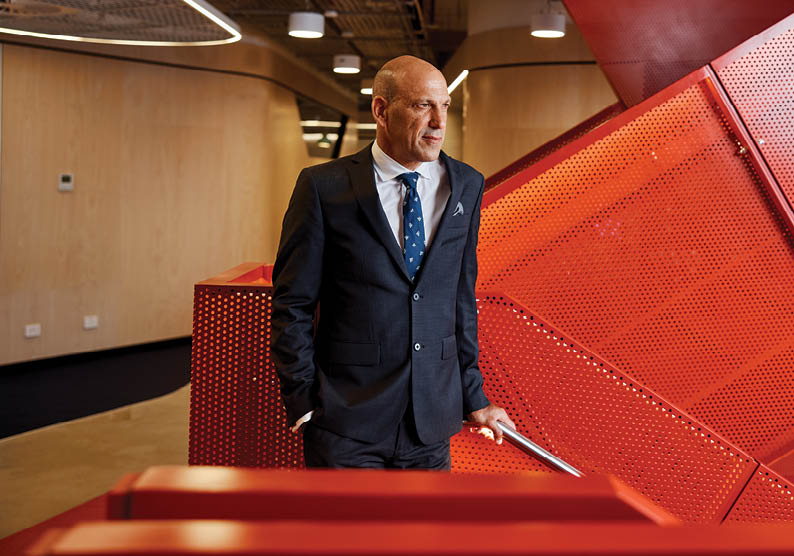
The sum of all parts
On the morning the Journal sits in at Liverpool Local Court, Magistrate Abdul-Karim walks onto the bench with the long, decisive steps of someone eager to reach a destination with a friendly smile. This is a reassuring sign for the public and the defendants that a human on the bench is willing to hear their case, though nothing in the magistrate hints of weakness.
He talks to the defendants with the reassurance of a neighbourly voice. When he needs to be, he’s assertive in a way that disarms the unobservant defendant who mistook his affability with charity. At a particular moment, a defendant tried to reason with an overly emotional story after the magistrate had pronounced his sentence.
“I considered that, but this is my final decision,” the magistrate quickly responds, in a way that showed that the matter is settled, the discussion over. It is not like talking to a father or a brother, but rather to a respected uncle who you want to avoid disappointing.
“I have great empathy for those who appear before me because a lot of them come from a disadvantaged background”, he says. “But ultimately, it’s your job to apply the rule of law”.
The rule of law. He raises this topic several times in the conversation with the Journal. Not because he is reminding himself of its importance but because it feels like it is constantly on his mind.
He believes society can do more to help the disadvantaged, but acknowledges that is not the function of a magistrate.
“It takes a personal toll on you”, he admits, “and it allows me to reflect on my upbringing”.
Even in this situation, Abdul-Karim sees himself as fortunate. Even if he witnessed the horrors of war at a young age and was forced to move to a different country – another hemisphere even – under strenuous conditions, he still has compassion for those who have been forgotten by our society, including those who entered and suffered within the foster care system from a very young age, to whom drug abuse is now the only coping mechanism they can find.
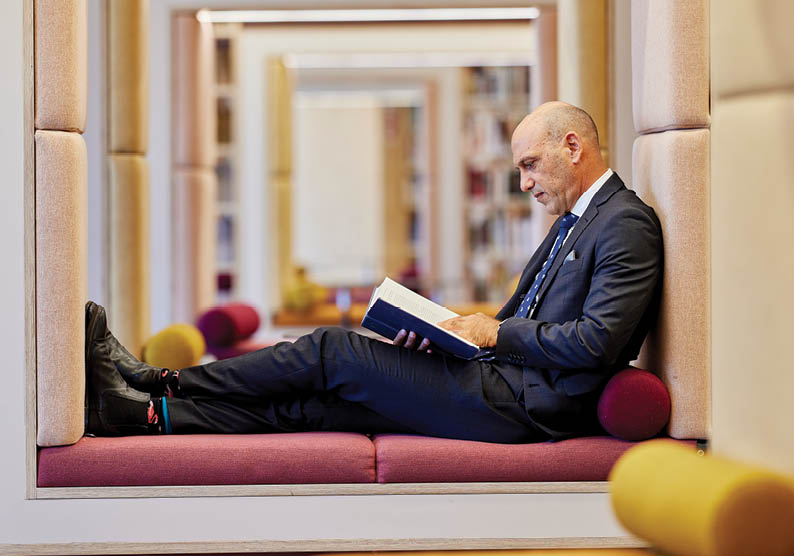
“You must stay detached; otherwise, you cannot function correctly. It’s not your responsibility,” he says.
Abdul-Karim supports the application of therapeutic jurisprudence in local courts. He says it helps to break the cycle of those continuously in and out of jail, that it instead recognises the failures of a perspective that centres its attention only on the recovery of the citizen, as opposed to just punishment and rehabilitation.
“A person who engages in domestic violence because all they have experienced as a young child was domestic violence may not understand the gravity of the crime they committed because that is the life they’ve experienced,” he offers as one such example.
That’s not to say criminals should not be prosecuted, he says, but having witnessed the effect of hardship on people, Abdul-Karim believes it’s vital to steer the offender towards a path of breaking the cycle. Protect the community, he says, but also help the person better themselves.
The more you talk to Abdul-Karim, the more you see how much he emerges from the parts that made him. His mother, family, community, and mentors are all different pieces that complete the person standing on the bench.
The British poet John Galsworthy said, “A man is the sum of his actions”, but it’s vital to understand our actions are the result of our influences. Lebanon is a distant memory that Abdul-Karim still holds close to himself. He has not been back since he left with his family, and his connection to that land is only through some distant relatives who remained and his own memories.
He grew up in a small village with little to offer besides playing soccer with his friends. The war, as expected, had a significant impact on his life. Abdul-Karim remembers life in a bomb shelter with little food. Children accept the reality they are in with the ingenuity of innocence. Abdul-Karim carries in his wallet a delightful photograph of him and his sisters sitting on an unexploded bomb with an abandoned tank in the background. The children smile gleefully, like rascals holding up an imaginary fort.
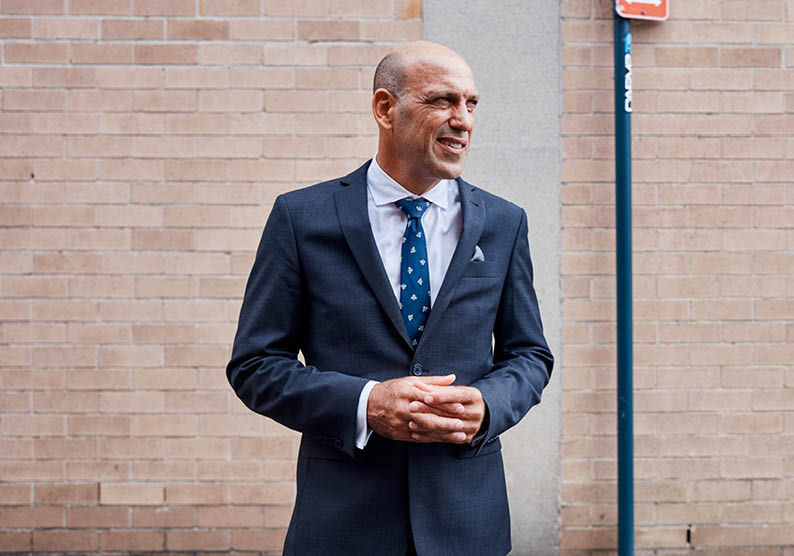
Yet he also holds the memory of tragedy and pain. In a challenging moment, he tells the story of a cluster bomb that exploded near their shelter. His family were receiving guests, so, as expected, the good seats in the house were reserved for them – the lounge instead of the beds standing in the corner. The shelter, he recalls, would have been five meters by five meters, and the lounge just happened to be next to the door.
When the bomb exploded, shrapnel came inside, and in the middle of the confusion, the child of the guest had been hit in his chest. The tableau affected him; even today, he finds himself emotionally affected by just remembering the image of a father carrying a dead child in his arms. The child would have been about four or five years old.
“I would like to think that it gives me a sense of empathy”, he says, reflecting on his upbringing and experience as a refugee when attending court. “We all experience hardship in different ways: some because they’ve lost their parents at a young age, or they might have been subjected to a natural disaster. But it gives you a level of empathy, a certain level of humanity, because to apply the law without a human perspective, you become a robot”.
He sees value in the plurality of Australia but believes there is still a greater need to take advantage of this melting point and give opportunities to those who come here for a better life.
He is fortunate for the chances given to him and his family, and he questions how different his life would’ve been if his parents hadn’t come to Australia.
“One of the reasons why Australia is so successful is because it’s a plural society that blends different cultures and perspectives,” he says.
“All those perspectives melted together and developed the country’s laws, how the government functions, and how large corporations and businesses operate.”
“One of the reasons why Australia is so successful is because it’s a plural society that blends different cultures and perspectives.”
Does he feel the weight of responsibility for what he may represent to other people who come from similar experiences? He hopes he is setting a positive example that others may follow, but more importantly, “I would like to think that in the future, my story is not unique”. He hopes to see more people from different ethnic backgrounds, minority groups, and women in leadership roles in government and, of course, in law.
He feels, for example, the positive reaction of people in court when seeing someone from a similar background on the bench. To see a reflection of their culture sitting in a respectful position is encouraging. He admits defendants who appear before him, aware of his background, confess to accepting his decision, even if not in their favour, because they believed they were being heard; “and not only attended by being allowed to express their submission to the case they represent but by someone who understands their background.”
Abdul-Karim sees the value of role models in much of what he does. It is a mark of someone blessed by many important ones. To succeed as a lawyer, he says, you need to have an excellent mentor to champion your cause.
While at the Commonwealth DPP, he found support from his supervisors and other senior counsel. Justice Bellow is one of the names that come up; he worked on several cases, and he was someone who he always saw as a sounding board, as well as the person who encouraged him to apply to the Local Court and then proudly attended his swearing-in ceremony.
“When you work closely with people that you respect, they encourage you and give you pointers on what steps to take in your career,” he says. “I was fortunate to work with a lot of people who held or currently hold, judicial offices like forcer director Justice Robert Bromwich, Justice Wendy Abraham and Justice Sarah McNaughton.”
Today, Abdul-Karim lives with Salma in the Sutherland Shire. Salma studied law and graduated with an honours degree from Sydney University, but she did not enjoy practising, so she changed careers. Their children, Nicholas and Claudine, also do not work in law.
“I think when I first started working as a lawyer, I worked long hours – perhaps some might say I was a workaholic – but as a result my family had to suffer”, he says. Not seeing his children grow up had an impact on the whole family.
“When I started out in the late 1990s, you were required to work long hours, and if you did not do that, I don’t think you were able to get through the work and do justice to the cases that are before you,” he says.
This dedication to the job remains in the back of his mind, like a firm sense of duty for the responsibility he swore to back in 2017. “An important aspect in succeeding in the law is understanding that you will need to go through a process of learning and continuing to learn”, he asserts.
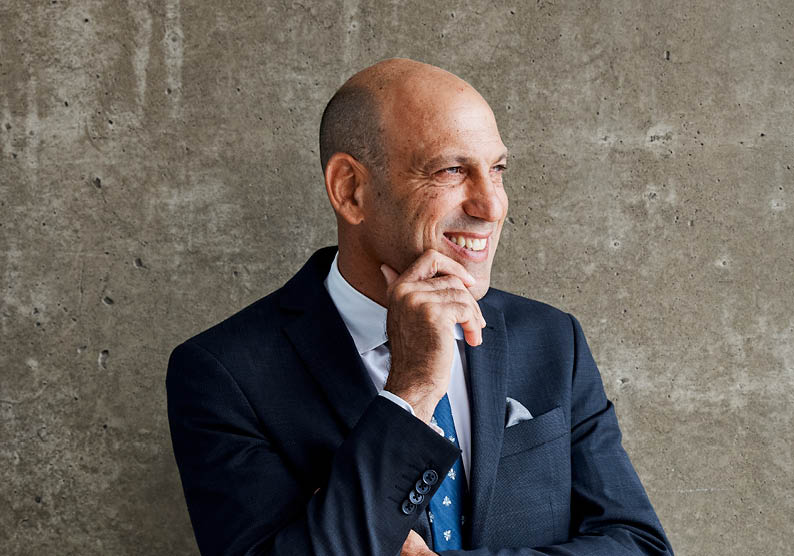
“You need to reinvent yourself, continue to learn and develop, and engage in self-reflection. [Ask yourself] ‘How did I do that? What areas can I improve in? Is there a better way of solving this problem?’ If you engage in that process, you will continue to improve and develop as a professional, but also help move the law in a positive way.”
Abdul-Karim likes to surf when he hangs up his gown. He has a group of friends with whom he surfs, colloquially called “the Justice crew”. None of them are lawyers or related to the legal profession, which he takes as an opportunity to see how non-lawyers perceive social issues.
“It is important to understand the law in its social context”, he concludes. “The law is as good as it is to the extent that it is understood by the community. When there’s a report in the media about a decision, seeing how people who are not lawyers perceive it underscores the importance of ensuring that court decisions are properly understood.”
Recently, he has been learning to foil surf, which uses hydrofoil boards to lift the board slightly and allow it to glide over the water more smoothly. He says his wetsuit is his “other suit” and that he feels like a different person when he jumps into the water.
He jokes about how someone his age is still trying to learn new tricks, but if anything, it shows his endless curiosity for knowledge, in continuous process of education. It is what moved him from science to law, from international prosecution to the intricacies of the local court. In the process, he applies the experiences of his past roles to all his new positions. Science, for example, gave him the skill to look at a problem methodologically to find a solution which stands up to scrutiny and criticism. Everything is there for a reason; every experience adds up to the person walking onto the bench with a friendly smile.
A week after our conversation, we meet again for the Journal photoshoot. Abdul-Karim insists on bringing breakfast for the staff and crew, a box of Lebanese treats to share. He points at the zaatar and the spinach fatayer and comments, “Think of my childhood when you eat these”. It was hard not to do. It all goes together.

